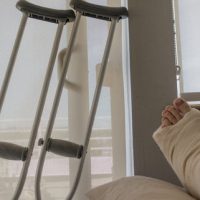What Are Emotional Distress Damages in Florida?

After an accident, victims can receive money for their injuries called “damages.” In Florida, victims can receive compensation for medical bills, lost wages, and usually physical pain and suffering. In some situations, emotional distress damages might also be available.
What Is Emotional Distress?
Not all injuries are visible. After a serious accident, victims can suffer from a variety of negative emotions, such as:
- Depression
- Anxiety
- Fear
- Irritability
- Sleeplessness
- Anger
- Grief
These negative emotions can seriously undermine a victim’s quality of life, so the courts allow them to receive damages. Although money is an imperfect substitute for getting your peace of mind back, it is the best substitute a court can offer.
When Are Emotional Distress Damages Available?
Florida places an important limit on emotional distress damages. Generally, you can only receive them if you suffered a physical harm in some way. This is called the “impact rule,” and it keeps many victims from being able to sue.
For example, a driver might have been sitting in an intersection, preparing to make a left-hand turn. Just before turning, a semi tractor trailer races past her going 35 miles over the speed limit. He just misses crashing into the car, but the car’s driver suffers from sleeplessness and anxiety as a result of the near miss.
Unfortunately, the driver cannot receive emotional distress damages because she was never contacted. However, if the big rig slammed into her car and caused a physical injury—even a minor one—she could sue and ask the court for emotional distress damages.
There are some exceptions to the impact rule that might apply to your case:
- If you witness an accident in close proximity and manifest a physical injury shortly thereafter, you can sue for emotional distress. For example, you might see your child be run over and go into shock.
- If you are suing for an injury to your reputation, such as defamation.
- If you claim someone committed intentional infliction of emotional distress.
- If you suffer emotional distress after a stillbirth or wrongful birth.
These are just some of the exceptions to the impact rule. Before assuming you have no valid claim for emotional distress, you should meet with a Delray Beach personal injury lawyer for a free case review.
How Do You Document Emotional Distress?
To prevail at trial, you will probably need to convince a jury that you are suffering from serious emotional distress. To help your case, you can introduce the following evidence:
- Your own testimony about the intensity and extent of your emotional distress.
- The testimony of friends and family who have noted changes in your mood and behavior.
- Testimony from your therapist or psychologist.
- Medical evidence, if your emotional distress has manifested in physical symptoms.
- Proof of psychiatric medicines a doctor has prescribed, such as antidepressants or tranquilizers.
The evidence you need will depend on the circumstances, but you have the burden of showing that you have suffered emotional harm that warrants compensation.
Can a Lawyer Help?
Accident victims deserve compensation for their visible and invisible injuries. At Earnhart Law, our personal injury lawyers will carefully assess the circumstances surrounding your accident and identify what compensation is available. Contact us today for a free consultation.
